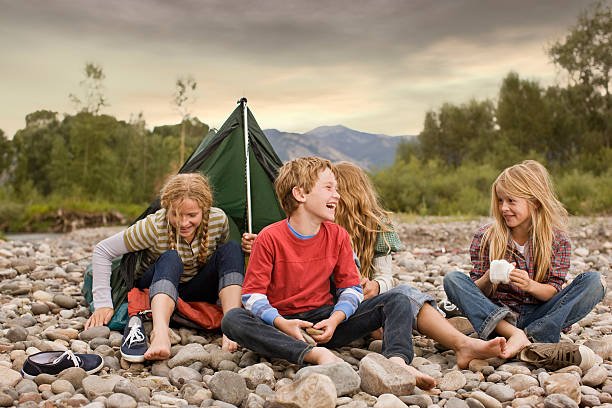Top 5 Outdoor Activities for Kids

Top 5 Outdoor Activities for Kids
Top 5 Outdoor Activities for Kids
Getting children outside and away from devices might seem like a genuine difficulty in today’s digital era. Still, the advantages of outdoor activities for children are many and can greatly affect their emotional, psychological, and physical states. This page will discuss the best five outdoor activities for children that are both interesting and good for their general growth. Along with keeping children in shape, these pursuits will boost social skills, imagination, and a connection to the environment.
The Importance of Outdoor Activities for Kids
Children’s development depends critically on time spent outside. It’s not only about physical activity; outdoor events provide a whole approach to well-being and education.
Physical Health Benefits
Children who play outside participate in a variety of physical activities vital for their development. Running, leaping, climbing, and exploring are natural means of building strength, endurance, and coordination. Additionally, outdoor play helps to battle childhood obesity, which has grown to be a major issue in many countries.
Cardiovascular Health
Participating in outdoor sports or even basic games like tag or bike riding will greatly increase cardiovascular fitness. The development of a strong and healthy heart depends on the cardiac pumping that these activities induce.
Muscle and Bone Development
Hiking, playing on jungle gyms, or climbing trees all assist to build bones and muscles. For young children, these activities offer a full-body workout that is far more efficient than any indoor fitness program.
Emotional and mental well-being
Outdoor play has equally important psychological advantages as physical ones. Time in nature has been shown to help lower symptoms of depression, anxiety, and stress. For children, the outdoors can naturally uplift their attitude.
Interaction with Nature
Youngsters who spend more time outside become closer to the natural world. This connection not only increases their respect for their surroundings but also helps them to be peaceful and healthy.
Cognitive Development
In ways that indoor play cannot, outdoor play encourages cognitive growth. The open surroundings, the erratic nature, and the necessity to negotiate several obstacles improve critical thinking, inventiveness, and problem-solving abilities.
Development of Social Skills
Whether team sports, group games, or just hanging around in a park, outdoor activities may involve interaction with other kids. These interactions are crucial for growing social skills.
Coordination and Teamwork
Group projects and sports help kids learn how to cooperate toward shared objectives. This vital ability, teamwork, will help them in the classroom, at the office, and in life generally.
Effective Communication Skills
Playing with others requires children to be good communicators. These exchanges help youngsters acquire critical communication skills, whether they are negotiating turns on the swing or game rules.
Encouraging Imagination and Creativity
Outdoor play encourages imagination and creativity. Children can let their imaginations run wild, free from walls and regimented activities. The opportunities are limitless, whether they are designing a new game, acting as explorers, or building forts.
Independence and Confidence
Outdoor pursuits also give children chances to challenge their limits, take calculated chances, and make autonomous judgements. This increases their confidence and encourages their independence.
Top 5 Outdoor Activities For Kids
After we have proven the value of outdoor activities, let’s investigate the top 5 outdoor activities for children that might have a long-lasting good influence on their lives.
1. Nature Scavenger Hunts
An exciting approach to getting children outdoors and learning about their surroundings is through nature scavenger hunts. Children must locate a list of natural objects—such as a particular kind of leaf, rock, or insect—that they should be able to identify.
Setting up a Scavenger Hunt
Making a checklist of things probably found in your neighbourhood park or backyard will help you design a nature scavenger hunt. These could comprise a pine cone, a feather, a smooth rock, or a particular kind of flower. Give every child a list; then, let them investigate.
Advantages of Nature Scavenger Hunts
- Increases Observation Skills: It teaches children to pay closer attention to their environment and identify elements they might otherwise overlook.
- Encourage Curiosity: Discovery of new plants, insects, and natural items piques interest and promotes a love of learning.
- Prompts Teamwork: When done in groups, children develop teamwork and the thrill of discovery sharing.
2. Games and Outdoor Sporting Activities
Kids remain active and healthy from age-old outdoor games,, including football, basketball or a basic game of tag. One might play these sports in a neighbourhood sports pitch, park, or backyard.
Kids’ Popular Outdoor Sports
An excellent team sport that increases endurance, coordination, and teamwork is football.
Basketball improves hand-eye coordination, agility, and teamwork,, among other things.
Tag is a basic yet exciting game that involves running, dodging, and strategising.
Advantages of outdoor sports
- Physical Fitness: Sporting activities help to increase strength, flexibility, and cardiovascular health.
- Team Spirit: Children learn about leadership, teamwork, and handling rivalry in team sports in team sports.
- Fun and Excitement: Children are kept driven and involved by the excitement of competition and goal attainment.
3. Hiking and Nature Walks
Hiking is a fun way for children to explore nature and get exercise. Even an essential stroll in a local park might become an adventure full of educational possibilities.
Selecting a Kid-Friendly Trail
Choose paths suitable for children’s age and degree of fitness when scheduling a walk. To keep them interested, search for paths,, including streams, bridges, or wildlife.
Benefits of Hiking
- Physical Endurance: Important for general health, hiking increases stamina and resilience.
- Nature Connection: Learning about many plants, animals, and ecosystems helps children to develop a closer relationship with their surroundings.
- Family Bonding: Hiking is a terrific way for a family to spend quality time away from daily distractions.
4. Garding
Though it seems like an adult hobby, gardening is a tremendous outside pastime for young people. Garding teaches responsibility, patience, and the pleasures of tending life,, whether one is growing flowers, vegetables, or herbs.
Designing a Kid-Friendly Garden
Start with simple, quickly grown herbs, tomatoes, or sunflowers. Give young children equipment appropriate for their size and assign them certain chores, such as harvesting, weeding, or watering.
Benefits of Gardening
- Understanding Growth: Gardening helps children better appreciate the natural world by teaching them where food comes from and how plants grow.
- Increase Responsibility: Taking care of plants calls for consistent attention and care, thus guiding children towards responsibility.
- Sensory Development: Gardening improves sensory experiences by involving touch, scent, and sight, thus increasing the exciting nature of learning.
5. camping
One of the most absorbing outdoor pursuits available to children, camping provides a whole experience of nature. Whether you’re driving to a campsite or building a tent in the backyard, camping offers a chance to unplug from technology and commune with the natural world.
Getting Ready for a Camping Trip
Involve the children in planning your camping vacation. Let them choose the campsite, assist with gear packing, and create the schedule of activities. Bring lots of snacks, water, and safety gear as well.
Activities in Camping
Start Gazing: Instruct children about the constellations and let them stare at the stars.
Campfire Cooking: Let children assist in preparing essential dishes over the fire, including hot dogs or marshmallows.
Exploring the Area: Go on little excursions around the campsite,, searching for unique rocks, flora, or animals.
Benefits of camping
- Survival Skills: Children learn fundamental survival skills,, including tent building, making a fire,, and cooking outdoors outdoors from camping.
- Appreciation of Nature: Spending a night under the stars helps one develop a great respect for the natural surroundings and their beauties.
- Independence: Children learn to do things on their own, therefore increasing their confidence and sense of independence.
Making the Most of Outdoor Activities
Although these pursuits are great on their own, there are methods to improve the experience and make them much more helpful for children.
Encouraging Imagination and Creativity
Outdoor play can be unstructured. Invite children to design their games and apply their ingenuity. This not only increases the fun value of the activities but also stimulates imagination and the ability to solve problems.
Unstructured Play
Let kids play without a defined goal, and you can have some of the most imaginative and exciting interactions. Unstructured play is essential for their growth,, whether they are building a fort, acting as explorers,, or just running around.
Priority One Safety
Although outdoor sports are entertaining, safety always comes first. Make sure children understand fundamental safety guidelines for every activity, keep hydrated, and have suitable gear for each.
Balancing Outdoor Play with Screen Time
Balancing screen time with outdoor activities is absolutely vital in today’s digital era. Plan particular periods for outdoor play so that children receive sufficient physical exercise.
Conclusion
Childhood’s most significant outdoor activities provide many advantages for both physical and psychological well-being. The top 5 outdoor activities for children described here—nature treasure hunts, outdoor sports, hiking, gardening, and camping—offer a broad spectrum of experiences that can help children develop, learn, and flourish. Including these outdoor activities into their daily schedule will enable your youngster to grow to love the surroundings.






